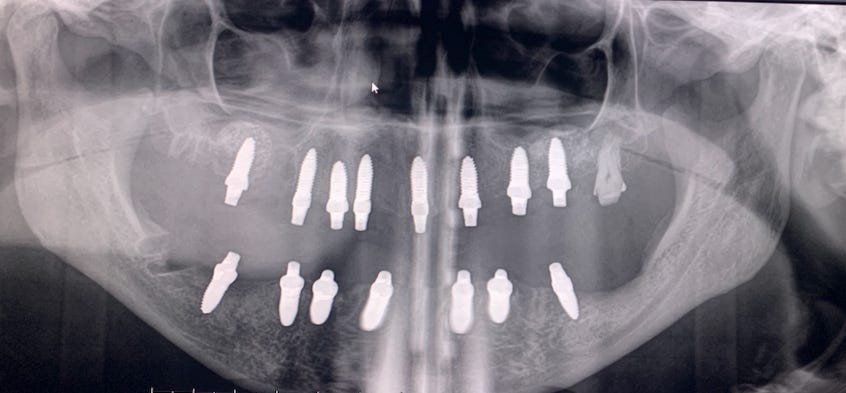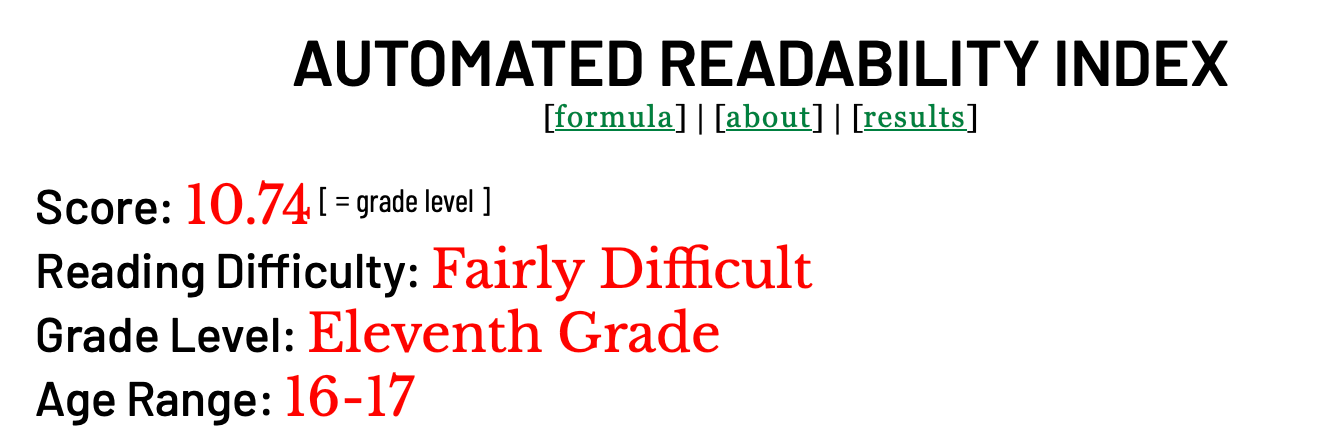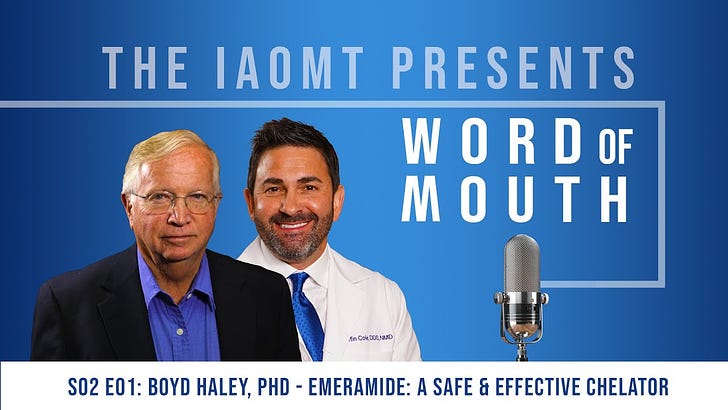It all started when he treated her to decades of various drillings and fillings, and I am not sure exactly what else. Although Judy had excellent cosmetic results, it came at a deadly price. I, too, became a patient of the same “tooth doctor” after I married Judy 35 years ago. Since I already had seventeen mercury fillings, he must have thought I had little left to “work” on, so he generally left me alone.
Four years ago, Judy became progressively sicker over about a year. We consulted with more than 20 board-certified Kaiser doctors, and none had a clue about her problem. So, I studied the issue and asked outside physicians what to do. Following their advice, I wrote to Judy’s doctors, directing them to run various tests. If you put your instructions in a letter, it becomes a part of the chart, so doctors are likelier to listen. In short order, this resulted in a diagnosis of AL amyloidosis. Until recently, this condition was rapidly fatal, but new medications now allow more prolonged survival.
The Kaiser oncologist categorically refused to use daratumumab, the drug that later stabilized Judy’s disease. He chided me for suggesting it, saying it was “not the standard of care.” So I took her to Stanford. This cost more than $30,000 for two chemo sessions and two doctor visits, one of which was virtual. Judy’s life was saved, but she became a dependent, miserable cash cow of Rockefeller Medicine. Throughout her illness, we were forced to hire doctors outside Kaiser to direct Judy’s care.
Among many other problems during her illness, she had heavy salivation. All night, every hour, I listened to her nearly choke to death in bed beside me. Since I was formerly a board-certified emergency physician, I understood compromised airways and always feared the worst. She was optimistic and did not think it was dangerous, but she was often in jeopardy.
Judy and I are (reasonably!) open with each other, and I thought I knew (nearly!) everything about her. She was always unwilling to share much about her teeth, and I respected her privacy for decades. But as I learned more about dentistry, I had to find out what was in her mouth.
Her illness was a detective story. The “break in the case” was when we were in Tijuana having my mercury fillings taken out. I was sneaky—I asked her to let the dentist, Dr. Lagos, “have a quick look” and “grab an x-ray to be sure everything was OK.” When they exited the exam room, Judy was beaming. She told me, “No worries. Everything is fine.”
I may have been married last week, but it was not yesterday. I grabbed Lagos by the elbow, pulled him into another room, and closed the door. He knew that I knew the jig was up and admitted that Judy had four (4) root canals. He did not like them any better than I did, but he knew better than to argue with a 69-year-old woman.
Since I had been studying full-time while everyone else was playing, I saw the whole thing immediately. Judy’s amyloidosis was caused by abscessed root canals spreading infection and inflammation throughout her body. From Dr. Gammal’s book (Chapter 6), I knew removing them would create better than even odds of curing her. He told many stories about breast cancer and other serious diseases going away when root-canalled teeth were taken out.
Judy is profoundly skeptical, which has served her in good stead her whole life. She initially refused to consider that, just this once, I might be right. After all, her mouth did not hurt, and her teeth looked great. To save her life, I would have to persuade her to cooperate.
I loved Judy dearly and did not want to lose her. Her refusal to believe me made me feel for a month like my head was being held underwater. I coaxed her into reading much of Dr. Gammal’s book and finally had her watch the Root Cause video. I initially thought I would have to tie her to the couch in front of the TV.
As Judy was balking, I was researching. Becky Dutton (Chapter 11) told me to see a particular European dentist. When Judy finally allowed that she might consider doing something, I put Becky on the phone to work her over.
Next was the flight overseas and six hours of surgery under general anesthesia. The dentist removed all but one of Judy’s teeth, including the infected root canals. The operating room was filled with a foul stench because my wife’s gums were abscessed. He later said her condition would have killed her.
In five hours, he cleaned the area, bone-grafted it, and inserted fifteen zirconia ceramic posts to support the new teeth and bridges:
These are biologically inert. Traditionally, titanium is used, but it causes chronic infections and sheds toxic metals.
We hung out for a month for follow-up visits. During the post-surgical period until the new teeth were installed, Judy was instructed to chop up and swallow her food without chewing. She did not like it but adapted and did not lose weight.
It is three months since the original surgery, and Judy feels fantastic. She has the energy to start new projects, which is the best evidence of good health. She is lifting weights for the first time in four years. She has also been able to discontinue some of her blood pressure drugs because the infection stress is gone. Her skin is clear from blemishes that her chronic infection may have caused. Since her inflamed mouth abscesses caused her salivation, this decreased when the infection was removed.
Judy has had nonfunctional temporary teeth installed for three months for cosmetic purposes. But as I write this, she is getting fitted with the permanent ones. These are beautiful and stronger than her originals. The process is half the price it would have been in the US, but we nearly had to sell real estate to pay for it. This is not easy for retirees on a fixed income.
PS: If you have a problem like Judy’s, email Becky Dutton (beckydutton@understandingscoliosis.org), and she will advise you. ❤️❤️
PPS: Breast implants, especially silicone ones, cause a similar syndrome known as “breast implant illness.” They are often infected with bacteria and fungi, and the gel they contain is toxic, migrates, and occasionally causes cancer. I interviewed an expert about this HERE.
Stay tuned—Judy will be here on the podcast soon. If you want to read the rest of Judas Dentistry now, HERE is the download link. I will get it up on the sales platforms this week if I can find the time.
Parting Shot #1: Saying Goodbye to Drain People
by Robert Ringer (RobertRinger.com):
In my book Million Dollar Habits I wrote at length about the dangers posed by Drain People, those who drain others of time, energy, peace of mind, and, all too often, money. Unfortunately, there are no statutes on the books outlawing the actions of Drain People. The only foolproof defense against them is to keep them out of your life.
As a now-forgotten student of human nature once warned, you’ll never smell like a rose if you roll in a dunghill. No matter what else you do right, if you associate with the wrong people, it’s virtually impossible to succeed.
In addition to causing you endless complications, Drain People will make you look bad in the eyes of others because of the generally accepted truth in the old adage, “Birds of a feather flock together.” Whom you associate with is like a neon sign that informs the world where you are on the success ladder at any given point in time.
Early in my business career, a young hotshot marketing guru (“Frank Fabricator”) with whom I was involved in a business deal so offended me with his blatant deceit that I made the decision to strike him from my life and cut off all communication. I reasoned that if he could stoop to such a low level of integrity on this particular occasion, it must be such an entrenched part of his personality that he would not hesitate to do it again if the opportunity were to present itself.
Nevertheless, Frank sent several letters of apology to me over the years, and, masochist that I was, I finally relented. I not only reopened the lines of communication with him, over time I began discussing a number of business proposals with him as well.
The gory details of the story make me blush, so I’ll just skip to the bottom line. After a brief period of time, Frank, in a clear-cut manner, proved that the first time around was no accident — that he was an individual who was capable of descending to dastardly levels of insincerity. Not only did he once again display a stunning lack of character at the moment of truth ($), he managed to actually outdo his earlier reprehensible deeds.
This little anecdote may have reminded you of a similar experience from your own past, because most of us take the same classes during our enrollment at Homer Simpson U. It’s why they stamped “Doh!” on our diplomas when we graduated.
We would all do well to remember the Law of the Scorpion, based on a fictional tale of a scorpion who asks a frog if he can hitch a ride on his back to get to the other side of the pond. You already know the rest of the story or you wouldn’t be reading my blog, so I’ll just skip to the moral of this little tale, which is simple and straightforward: Once a Drain Person, always a Drain Person.
Meaning that a Drain Person simply can’t help himself, because his desire to drain you of valuable resources is irreversibly ingrained in his nature. Always keep this in mind and heed the wisdom contained in an ancient proverb that warns: You must have gold to make gold.
Make no mistake about it, eliminating Drain People from your life can be a difficult task. One reason for this is that sidestepping a persistent Drain Person can cause significant discomfort. Another is that even when you know someone is a Drain Person, it’s often tempting to make an exception for short-term profit. This is known as: Major Mistake. Trust me, you can’t afford the long-term cost of such an exception.
In addition, it’s human nature to want to give others the benefit of the doubt, which is why you often hear remarks like, “But he means well.” Maybe I’m dense, but I don’t understand what “he means well” means.
I know what high blood pressure is. I know what a headache is. I know what aggravation is. But I’m not sure what “means well” is. Does it mean that someone should be allowed to rob you of your valuable time and energy because he purportedly has good intentions?
The truth is that you don’t have enough hours in your life to give sufficient attention to the people whom you already know to be worthy of your time, so why stretch your welcome boundaries to include people who aren’t? It’s far better to trust your instincts and err on the side of caution.
I find that with each passing year, my instincts about people continue to improve, and undoubtedly you’ve found the same to be true of yours. The guideline I try to follow when it comes to handling potential Drain People is: When in doubt, keep them out!
The hard, cold fact is that people rarely, if ever, change, so it’s a big mistake to believe that a Drain Person will evolve into something he is not. On the contrary, bad character is malignant; it grows and spreads if not removed early on. Thus, once a person begins to drain you of time, energy, and other valuable resources, it’s wise to cut your losses short and get him completely out of your life.
And, by the way, be sure to close the door behind him, because once a small evil has managed to make its way inside, you can be sure that greater evils are waiting to gain entrance.
Yoho comment: All you have is your ability to focus. If you cannot pare away distractions, you are lost.
Parting shot #2. Measuring the grade level of your writing
The advantage of unembellished writing is that advanced readers can scan the material rapidly, yet basic readers still comprehend it. Writing this way is difficult for people with multiple graduate degrees. I sometimes use a thesaurus to translate the complexity in my head into more straightforward verbiage.
To test for readability, copy and paste your prose into THIS website. The lower the grade level, the better your writing is.
Here is the score for the essay about Judy above that was rewritten about 15 to 20 times. Writing like this takes work.
And this one is for Robert Ringer’s excellent essay above.

















Share this post